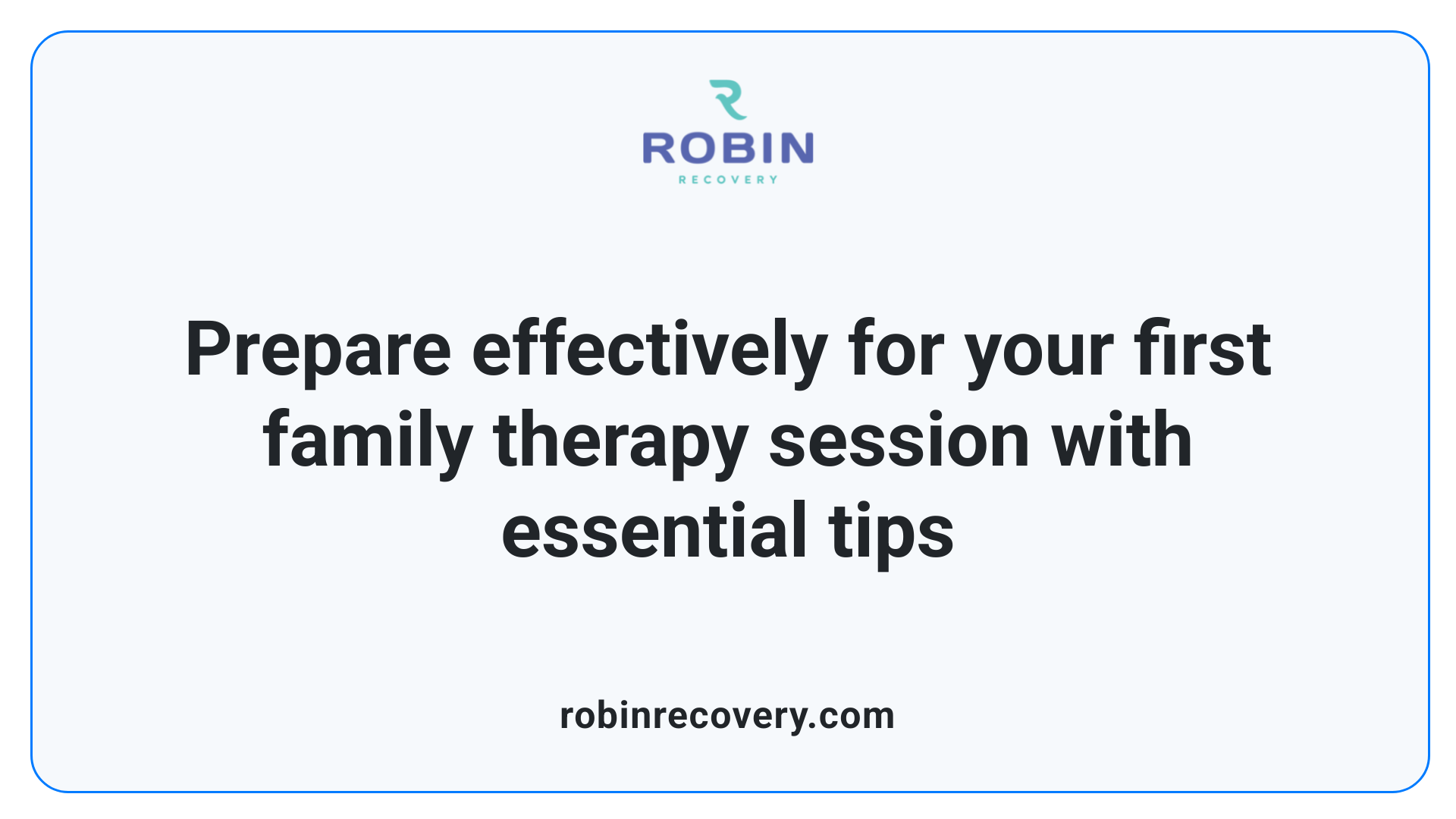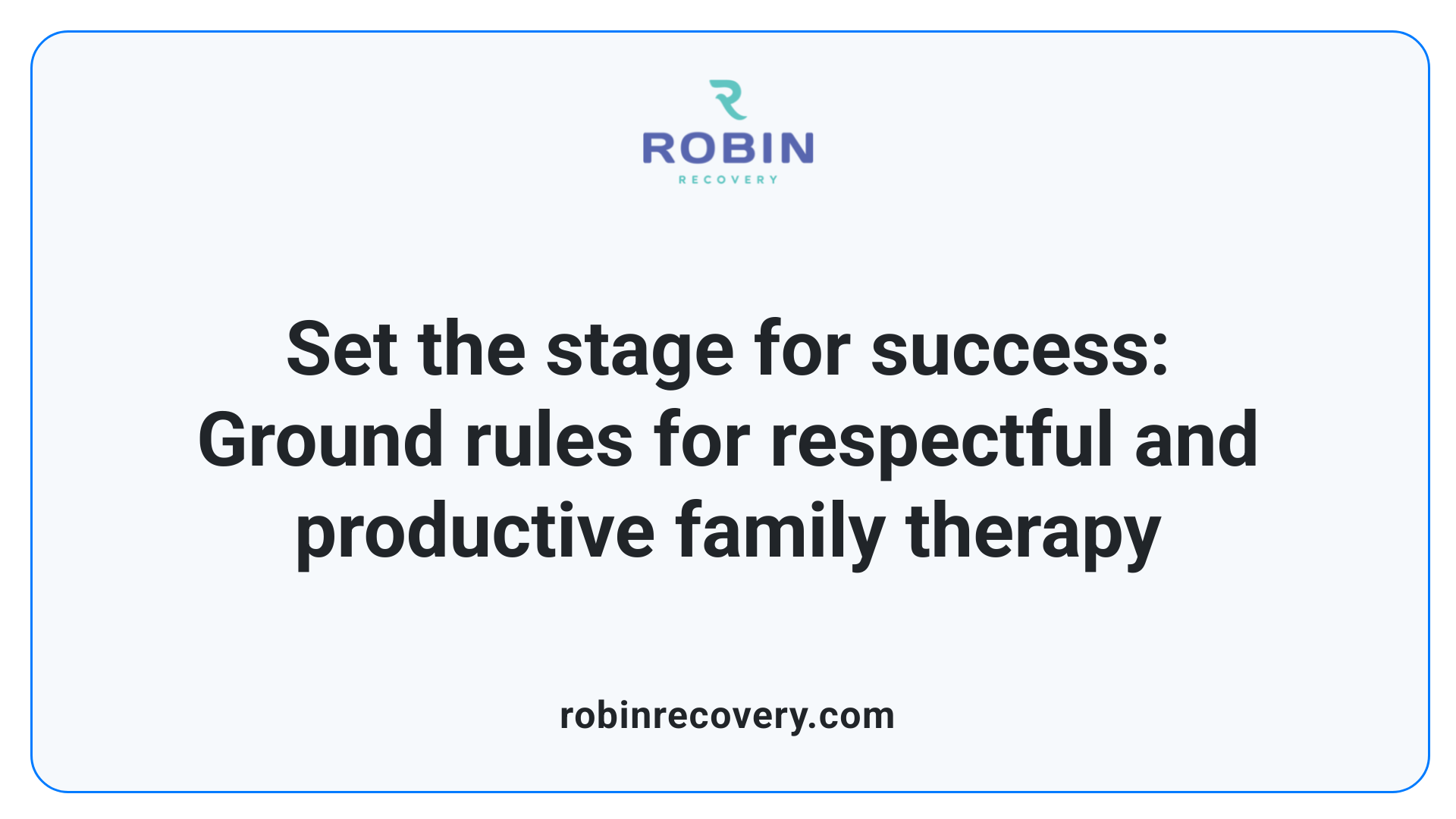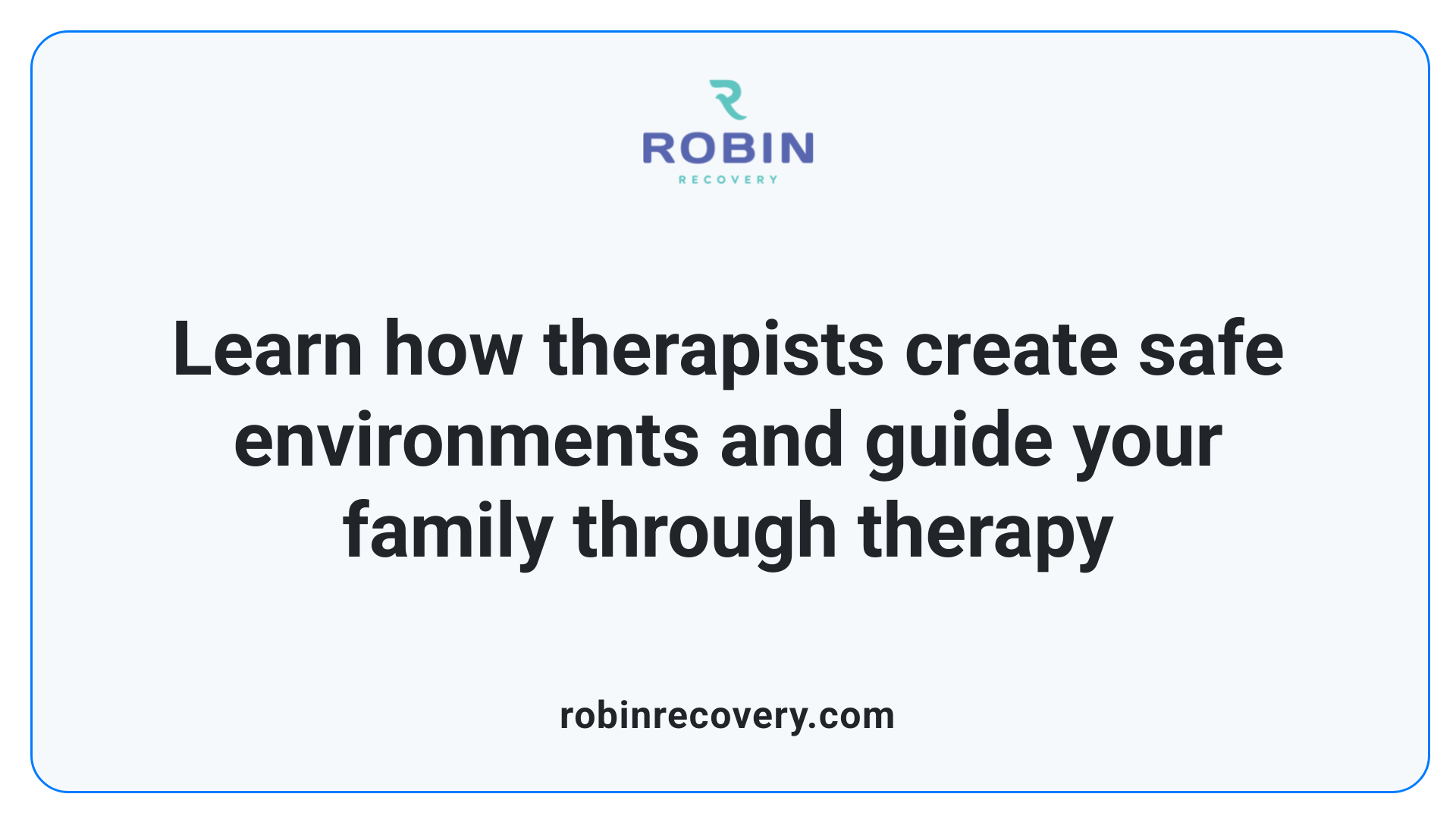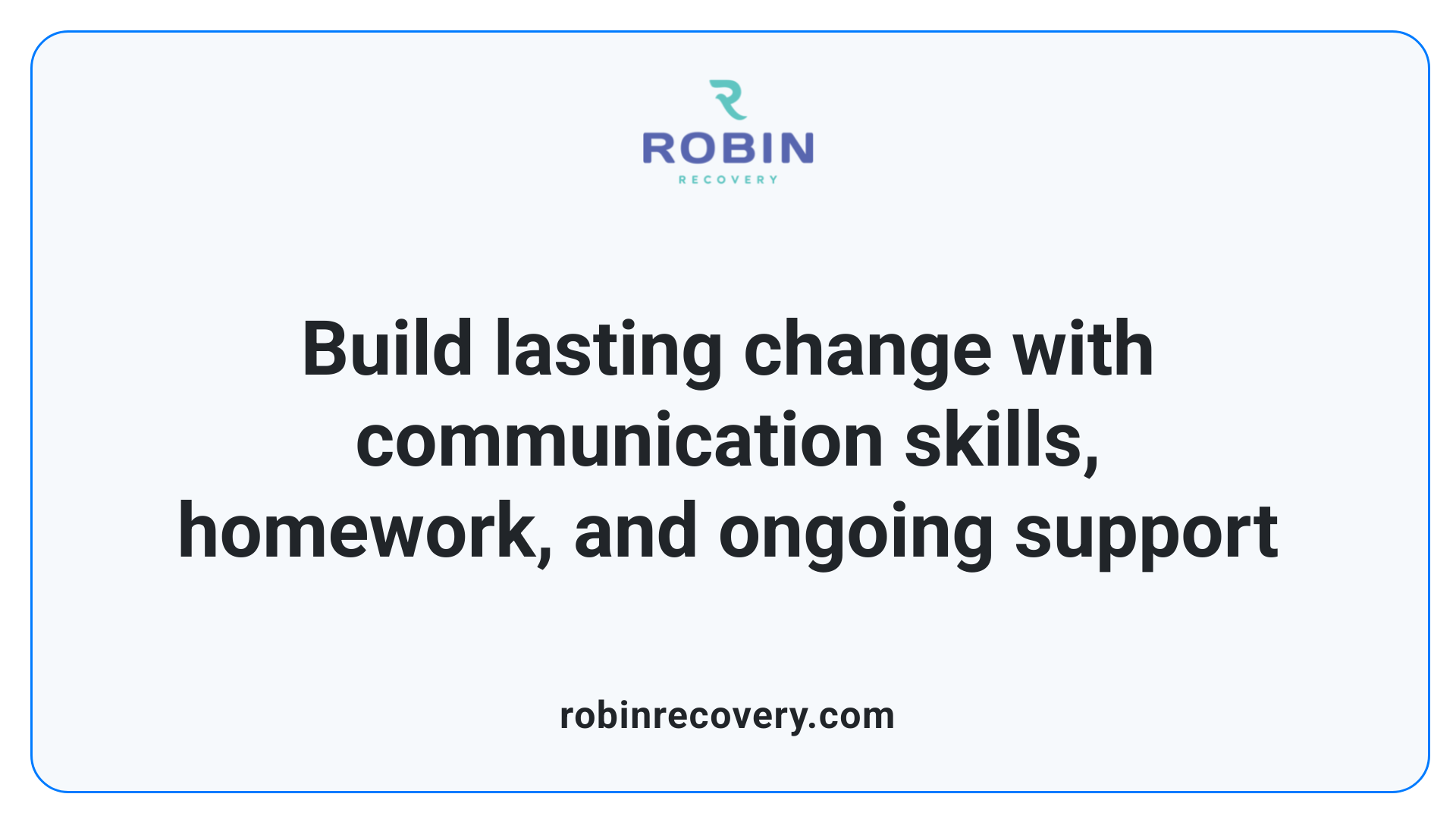How to Prepare for Your First Family Therapy Session in Recovery

Preparing for Success: Your Guide to the First Family Therapy Session
Family therapy is an essential component of recovery, providing a collaborative space for families to address challenges, improve communication, and support their loved ones in achieving lasting sobriety. Proper preparation for your first session can significantly enhance its effectiveness, laying the groundwork for meaningful change. This article offers comprehensive guidance on how to prepare mentally, emotionally, and practically for your initial family therapy experience, ensuring that your family can work together toward healing and growth.
Understanding the Purpose and Process of Family Therapy

What is the role of family therapy in recovery?
Family therapy plays a vital role in supporting recovery from addiction or mental health issues by addressing relational dynamics and promoting healthier communication. It involves the entire family or relevant members working together with a trained therapist to resolve conflicts, rebuild trust, and foster emotional support. Particularly in addiction recovery, family therapy emphasizes aftercare and relapse prevention, helping loved ones understand and support the recovery process. By creating a safe space for open dialogue, therapy encourages family members to share concerns and feelings, which can strengthen their collective resilience.
The therapeutic process also aims at enhancing understanding of underlying family dynamics that influence behaviors and emotional responses. When a family member is affected by substance use or mental illness, it impacts everyone. Family therapy thus helps the entire unit adapt to change, promote responsibility, and establish boundaries that support ongoing recovery and emotional well-being.
What are the main goals of family therapy?
The goals of family therapy include improving communication, resolving conflicts, and addressing emotional scars that hinder family harmony. Therapists work with families to set realistic objectives, such as rebuilding trust, understanding individual perspectives, and developing healthier interaction patterns.
Goals are often tailored to specific needs, whether supporting a family member in recovery, adjusting to life changes, or managing ongoing mental health conditions. Common aims involve helping family members support their loved one's sobriety, increasing emotional expression, and fostering mutual understanding. The therapy process can include exercises designed to enhance communication skills, empathy, and cooperation.
How does understanding family as a system influence therapy?
Family therapy views the family as an interconnected system where each member influences others. Changes in one individual can trigger shifts throughout the entire family network. When one member struggles with mental illness or addiction, it often causes ripples across relationships and family routines.
This systemic perspective underpins many therapeutic approaches, such as Structural or Strategic Family Therapy, which aim to identify and modify dysfunctional interaction patterns. By understanding the family as a whole, therapists help identify destructive cycles, unhelpful communication styles, and entrenched roles that maintain issues.
As behaviors and emotional responses are interconnected, making positive changes in one member’s behavior can lead to healthier family dynamics overall. Effective therapy helps families adapt to new patterns that support recovery, emotional health, and resilience.
Aspect Description Underlying Principle Family as a System Families are viewed as interconnected units where each part affects the whole Change in one influences others Goals Aims to improve communication, rebuild trust, resolve conflicts Systemic approach to emotional health Techniques Exercises, communication training, setting boundaries Modifying interaction patterns
Understanding these concepts helps families engage actively in therapy, recognizing that healing and growth encompass everyone involved. As each member participates and adapts, the entire family can develop a more supportive, functional environment conducive to recovery and lasting well-being.
What to Do Before Your First Session: Practical Preparation Tips

Jotting down questions or issues
Before your first family therapy session, it's helpful to prepare by noting down questions or specific issues you want to discuss. Think about what concerns or conflicts have been affecting your family dynamics. These might include communication problems, feelings of estrangement, financial disagreements, or the impact of significant life events like divorce or death. Having a list ensures you don’t forget important points during the session.
Deciding what to say amid conflict
Family sessions can be emotionally charged, especially in families with tension or conflict. It’s important to decide carefully what to communicate. Each family member should aim to express their thoughts honestly but thoughtfully, avoiding blame and negativity. Staying respectful and calm helps keep the environment safe and productive. It’s also wise to consider how to address sensitive topics without escalating disagreements.
Gathering relevant family history
Understanding your family’s background can significantly enhance the therapy process. Collect relevant family history, including past conflicts, patterns of interaction, and recurring issues. This may involve reflecting on your family’s communication styles, behavioral patterns, and emotional responses. In cases of addiction or mental health challenges, knowing the history can help the therapist identify underlying dynamics and root causes.
Filling out paperwork
Most therapy clinics require initial paperwork before your first session. This typically includes insurance information, medical history, and symptom questionnaires. Completing these forms in advance helps tailor the therapy to your family’s specific needs. Preparing this information beforehand ensures a smoother start and gives the therapist important context for understanding your situation.
Additional tips for a successful first session
Arriving prepared also means being ready emotionally. Relax before the session by taking deep breaths or engaging in calming activities. Dress comfortably to feel at ease. If you have questions about confidentiality, session structure, or treatment goals, don’t hesitate to ask. Remember, the first session is as much about getting to know each other as it is about setting a cooperative tone for future work.
Preparing thoughtfully for family therapy involves reflection, honesty, and organization. These steps help you approach the process with a constructive mindset and make the most of your sessions. The goal is to create an environment where everyone feels heard, understood, and motivated to work toward healthier family relationships.
Establishing Respectful Communication and Setting Ground Rules

What should I do to prepare for my first family therapy session?
Preparing for therapy also involves understanding the importance of respectful communication. Family members should decide carefully what to say, especially if there are tensions or conflicts. During the session, speaking calmly, remaining respectful, and avoiding arguments help create a safe and productive environment.
It is recommended to set some ground rules before the sessions begin. These rules might include listening attentively to each family member, refraining from interrupting, and avoiding blame or accusations. Such guidelines promote an atmosphere of understanding and help everyone feel heard.
In addition, family members should consider what questions or issues they want to discuss. Jotting down concerns, concerns, or questions ahead of time can make the session more focused and effective. Showing honesty and vulnerability can also facilitate deeper communication and strengthen trust with the therapist.
Creating a respectful environment is essential for addressing conflicts and emotional concerns. When everyone commits to these communication principles, therapy sessions are more likely to lead to positive change and improved family dynamics.
Maintaining a respectful tone and setting clear boundaries pave the way for open conversations, making it easier for families to work through long-standing issues and foster healthier relationships.
The Role of the Therapist in Setting the Stage

Creating a safe environment
The first step in family therapy is establishing a safe and welcoming space where all family members feel comfortable sharing their feelings and concerns. A therapist works to create an atmosphere of trust and respect, ensuring that everyone understands their opinions are valued without judgment. This safe setting encourages open communication and helps family members relax, making it easier to explore sensitive issues.
Explaining therapy roles and expectations
Once the environment is set, the therapist explains their role in the therapy process. Their primary goal is to facilitate communication, foster understanding, and guide the family toward healthier interactions. The therapist clarifies that they are a neutral party, not a judge, and their purpose is to help uncover underlying dynamics affecting the family.
They will outline what family therapy entails, including the typical structure—such as the number of sessions, possible activities, and how progress will be measured. It’s also important that the therapist discusses confidentiality policies, making clear what information will be kept private and under what circumstances disclosures might be shared.
Setting ground rules for confidentiality and conduct
To promote a respectful and productive environment, therapists set ground rules at the outset. These often include agreements on confidentiality, respecting others’ opinions, speaking calmly, and avoiding arguments during sessions. Family members are encouraged to listen actively, avoid interrupting, and share their thoughts honestly. If tensions arise, the therapist guides families on how to manage disagreements constructively.
During the initial meeting, the therapist will also ask questions about the family’s history, current issues, and goals for therapy. This helps tailor the treatment plan to the family's specific needs. Building rapport in this early stage is crucial, as it sets the foundation for effective therapy.
Why this approach matters
A well-prepared and transparent beginning can significantly impact the success of therapy. When family members understand their roles and what to expect, they are more likely to participate openly and commit to the process. The therapist acts as a facilitator who fosters empathy and understanding, helping families work toward healthier, more supportive relationships.
Understanding Family Dynamics in Recovery Contexts
How does addiction impact family relationships?
Addiction can significantly disrupt family dynamics, often creating communication barriers, deepening misunderstandings, and fostering emotional distance. Families affected by substance abuse may experience frustration, blame, and mistrust, which can hinder healing and recovery efforts. This strain can lead to feelings of estrangement, confusion, and emotional pain among family members. Recognizing these impacts is essential to tackling underlying issues within the family system and fostering an environment conducive to recovery.
How can I identify underlying family issues?
Identifying deep-seated family issues requires honest reflection and often professional guidance. Family therapy sessions usually start with assessments, where the therapist observes interactions and listens to each member’s perspective. Common underlying concerns include poor communication patterns, repeated conflicts, unresolved grief, or past family traumas. Emotional scars from these issues can influence current behavior and relationships, making them critical to address. By exploring these issues openly in therapy, families can uncover root causes that maintain dysfunction.
Why is it important to address emotional scars and emotional health?
Emotional scars from past experiences or ongoing conflicts can impede recovery and emotional well-being. Addressing these scars helps reduce emotional triggers that may lead to relapse or maladaptive behaviors. Family therapy emphasizes creating a supportive, safe space where members can express feelings, confront painful memories, and work toward healing. Improving emotional health benefits not only individual members but also strengthens the overall family unit, fostering resilience and better coping strategies in challenging times.
How does family therapy facilitate healing?
Family therapy aims to rebuild trust, improve communication, and create boundaries that support healthy interactions. Therapists set ground rules for respectful dialogue and help family members understand each other’s perspectives, emotions, and behaviors. Sessions often include exercises to enhance understanding and cooperation, with some homework assignments like engaging in shared activities or practicing positive communication.
What are typical goals in family therapy during recovery?
Goals generally focus on improving communication, rebuilding trust, and supporting the person in recovery. Establishing healthy boundaries, addressing resentment, and fostering emotional openness are also common aims. These objectives guide the therapy process, ensuring that each session works toward strengthening family resilience and fostering a supportive environment for ongoing recovery.
How can family therapy contribute to relapse prevention?
By fostering healthier communication patterns and conflict resolution skills, family therapy plays a vital role in relapse prevention. When family members understand how to respond to cues and maintain emotional connections, they can better support their loved ones' sobriety. Additionally, addressing emotional scars and tensions reduces the risk of interpersonal conflicts that might trigger relapse, creating a stable foundation for long-term recovery.
Aspect Focus Area Description Family Impact Addiction's effect on relationships Understanding how substance use affects trust, communication, and emotional bonds Addressing Underlying Issues Family conflicts and traumas Identifying and resolving deep-seated issues that influence behaviors and interactions Emotional Health and Healing Emotional scars and resilience Facilitating expression, forgiveness, and healing of past wounds to promote well-being Therapy Goals Communication, trust, boundaries Establishing clear objectives to guide therapeutic progress Relapse Prevention Supportive family environment Building skills for ongoing support, managing triggers, and sustaining sobriety
Ultimately, understanding family dynamics within recovery helps foster a nurturing environment. It promotes healing, supports sustained sobriety, and strengthens familial bonds, ensuring everyone can move forward together.
Building Commitments and Setting Family Goals
How can I set goals and understand the family therapy process before attending?
Preparing for family therapy involves reflection and open-mindedness. Start by considering what you hope to change or improve within your family. Common goals include enhancing communication, resolving conflicts, rebuilding trust, and supporting loved ones in recovery.
Familiarizing yourself with different family therapy styles, such as Structural, Strategic, or Systemic approaches, can help you understand what the process might involve. These methods often focus on understanding family roles, patterns, and interactions that sustain problems.
During your initial sessions, the therapist will typically assess your family dynamics, listen to each member’s perspective, and collaboratively establish goals that reflect your family's needs. This assessment helps tailor the therapy to target specific issues and promote growth.
It’s helpful to be honest and vulnerable about what each family member experiences and what they want to achieve. Recognizing that therapy is a process that requires patience and commitment can set realistic expectations.
By actively participating, sharing concerns, and being open to change, you can facilitate a more effective therapy experience. The ongoing nature of family therapy calls for continuous effort, but with clear goals and understanding, it can lead to stronger relationships and healthier family dynamics.
Fostering Long-Term Growth and Support

Practicing new communication skills
A crucial part of sustaining the benefits gained from family therapy involves regularly practicing the new communication skills learned during sessions. These skills—such as active listening, expressing feelings clearly, and giving respectful feedback—help build a supportive and understanding environment at home. Role-playing exercises and real-life applications during daily interactions reinforce these behaviors, making them a natural part of family dynamics.
Engaging in homework assignments
Therapists often assign homework to encourage practice beyond the therapy room. These assignments may include engaging in fun activities together, participating in family dinners, or observing positive interactions among members. Completing these tasks helps solidify the progress discussed in therapy, promotes healthier routines, and fosters a sense of joint responsibility for the family’s emotional health.
Supporting recovery outside sessions
Recovery is an ongoing process that extends well beyond the scheduled therapy sessions. Supporting a loved one in recovery involves maintaining open lines of communication, offering emotional support, and respecting boundaries. Families should aim to create an environment where members feel safe to share their feelings and experiences. Supporting each other through regular check-ins and shared activities enhances resilience and reinforces the changes initiated during therapy.
Strategies to maximize therapy effectiveness
To get the most from family therapy, all members need to participate actively and honestly. Setting clear, measurable goals fosters focus and accountability. Employing techniques like conflict resolution strategies, role-playing, and understanding family systems can address the root causes of issues. Preparing before each session—by jotting down questions or observations—ensures discussions are productive. It’s also beneficial to collaborate closely with a qualified therapist who can provide tailored guidance based on the family's specific needs.
In the long run, the combination of practicing communication skills, completing homework assignments, and ongoing mutual support builds a healthier family dynamic. Creating a consistent, respectful, and empathetic environment helps ensure lasting positive change, supporting recovery and overall well-being.
Overview of long-term family therapy strategies
Strategy Purpose How It Helps Practicing communication skills Improve daily interactions Builds understanding and reduces conflict Completing homework assignments Reinforces lessons learned in therapy Establishes healthy routines Supporting ongoing recovery Maintains emotional connection Fosters resilience and prevents relapse Collaboration with therapist Ensures tailored interventions Maximizes relevance and effectiveness
Engaging in these practices creates a sustainable environment where long-term growth and recovery are possible. The family’s commitment to continual progress promotes healing, enhances relationships, and supports the individual’s ongoing sobriety and mental health.
Moving Forward with Confidence
Preparing thoroughly for your first family therapy session empowers your family to approach the process with confidence and clarity. Understanding the purpose of therapy, setting achievable goals, practicing respectful communication, and engaging actively with your therapist all contribute to a more fruitful experience. Remember that family therapy is a journey of ongoing growth and healing—patience, openness, and commitment are key. With the right mindset and preparation, your family can build a supportive environment that fosters recovery, resilience, and lasting positive change.
References
- Tips for Successful Family Therapy
- What to Expect in Your First Family Therapy Session
- How to Prepare for Family Therapy
- How to Prepare for Family Therapy Sessions
- The Role of Family Therapy in Recovery
- What to Expect During Your First Counselling Session
- Preparing for Your First IFS Therapy Session
- Chapter 3—Family Counseling Approaches
- 6 ways to improve your family therapy sessions
- Family Therapy for Substance Use Disorders and Addiction ...
